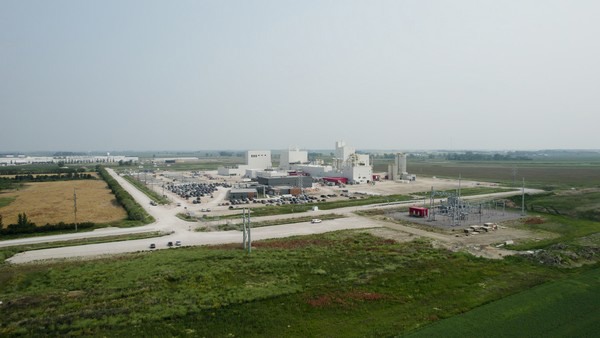Roquette celebrated the opening of its pea protein plant, further extending its position to meet surging global demand for alternative proteins.
“We see this as a transformational event in our history and a boost to the global plant-based food sector,” said Pierre Courduroux, CEO of Roquette. “Diets have changed considerably in recent years and the desire for alternative proteins continues to grow. Our company is proud to bring this new facility online to serve demand.”
 Roquette now has major pea protein facilities on both sides of the Atlantic.
Roquette now has major pea protein facilities on both sides of the Atlantic.
Roquette works closely with food leaders to develop products that contribute to the development of a new plant-based cuisine offering sustainable food for a healthier planet. Demand for pea protein has boomed with multiple industry estimates expecting an annual global growth rate between 15 and 24 percent over the next decade.
Roquette now has major pea protein facilities on both sides of the Atlantic.
The plant is situated just outside Winnipeg in Portage la Prairie, Manitoba, in the Canadian Prairies. The region produces peas, is within a day’s drive of the plant and has easy access to the United States and international markets by road, rail and air.
“The pandemic has led to stronger consumer demand for plant-based proteins while also disrupting global supply chains. This plant will help customers move forward rapidly on product development,” said Jeremy Burks, senior vice-president of plant proteins at Roquette. “The plant protein food sector needs investment, expertise and innovation to meet global demand and Roquette brings it all.”
 Left to right: Jeremy Burks, Dominique Baumann.
Left to right: Jeremy Burks, Dominique Baumann.
With this new facility, Roquette has largely exceeded the half a billion euros investment in plant proteins it had targeted in the period 2015-2020. This includes equity investments, acquisitions, upgrades to the plant in Vic-sur-Aisne, France and the new plant in Portage, which is Roquette’s largest ever North American investment. The 200,000-square-foot-plant has the capacity to process 125,000 tons of yellow peas per year. When combined with Roquette’s plant in France, the company’s capacity rises to 250,000 tons of peas per year.
“We are entering into the next level of quality, efficiency and commitment to the market,” said Dominique Baumann, managing director of Roquette in Canada. “The design of the plant is a proof-point of our sustainable development approach, with 100 percent hydroelectricity power and optimized water management.”
Peas are not only a protein source but also high in fiber and low in fat. On the farm, peas are environmentally sustainable. They require less water to grow than most other crops. Farmers also like that they use less nitrogen fertilizer while also producing compounds beneficial to soil health.
 For more information:
For more information:
James Bozikis
Michelle Finley
Roquette
james.bozikis@roquette.com
michelle.finley@roquette.com
https://www.roquette.com/
